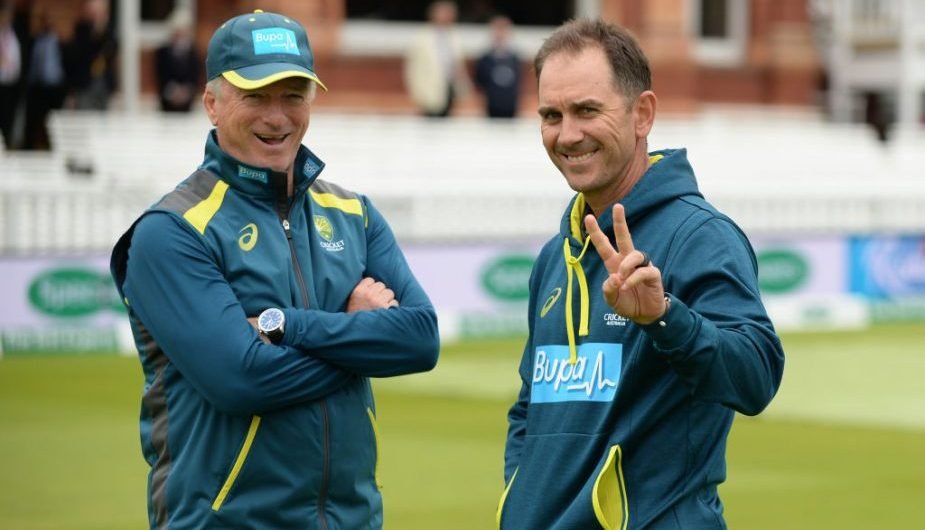Welcome to Justin Langer’s Australia

 by Phil Walker
by Phil Walker
@Phil_Wisden 6 minute read
Australia’s commanding display at Lord’s on day two of the second Ashes Test had Justin Langer’s influence stamped all over it, writes Phil Walker.
Justin Langer is onto something. To be fair, he generally is. Being onto something is what Justin Langer does. He was onto this job since before he retired, and now it’s emphatically his. And he’s not just a coach, hiding behind the shades. This latest iteration is Justin Langer’s Australia.
Gnomically towering over his low-profile stopgap captain, Langer has assumed ownership of it; and true to form, there is a purposefulness to it, a discernible identity. They play, as Steve Waugh said last week, with a new kind of conviction – one that’s been missing in recent years. And it’s working: the patented Langer-brand of bolshy exuberance, owlish wisdom and self-improvement double-speak is going very well indeed.
Josh Hazlewood and Pat Cummins excelled on day two of the second Ashes Test at Lord’s. #Asheshttps://t.co/RqxmJN0JRH
— Wisden (@WisdenCricket) August 15, 2019
They have a dream attack. An attack redolent of their last great attack to assemble on these shores. Three tall quicks, all right-arm, all unstoppable; and the best spinner in his field. The quicks all do broadly the same thing, from a similar angle, time after time, until they break you.
Peter Siddle is the slowest of the three, but to call him the workhorse would be to suggest that the others, Josh Hazlewood and the astounding Patrick Cummins, are, what, leaky dilettantes who only turn up after lunch? The truth is, they do the lot, together, in sync, all the time. It’s relentless. And just like at Edgbaston, England’s batsmen had nowhere to go, rattled out for 258 on a pitch offering less life than Thora Hird’s stairlift.
That Langer has chosen to overlook Mitchell Starc in favour of Siddle, declaring Siddle’s 0-31 in the fourth dig at Edgbaston the best none-for he’s ever seen, is the most obvious expression of his thinking. But by creating a cohort of quicks that feed off one another, crisscrossing, multi-tasking through the day, simultaneously dry and slippery, they have effectively created a fast-bowling hydra, of one mind and many tentacles. Behind the three selected today, lie James Pattinson and Starc. Chop off one head, and another sprouts up.
Here’s how Hazlewood took the second wicket of the morning…#Ashespic.twitter.com/oxb9Tq7D4Y
— Wisden (@WisdenCricket) August 15, 2019
Hazlewood took the morning session. It was telling that he chose the other end to that favoured by Glenn McGrath, because the much-trumpeted comparisons between the two are negligible. And as if to prove a point, he swung it late, at pace, away from the right-handers, which was never McGrath’s gig. Hazlewood bowled today like the best English seamer you’ve ever seen, though he was helped, in Jason Roy’s case, by a wafty prod in Hazlewood’s first over that looked as bad as it would have felt.
But it was Cummins’ day. Across a 10-over spell either side of lunch, the No.1 Test bowler in the world pummelled, in order: the middle of the pitch, Rory Burn’s bicep (twice), and the tips of Tim Paine’s gloves (taken on the rise, always on the rise). Eventually, Burns – who had played him as well as his technique will allow when he’s being bombed with two men catching on the leg-side and a man out for the unlikely hook – turned another rising judgment off the stickers and down towards the carpet, where Cameron Bancroft, perhaps the best short leg since Micky Stewart ambled into third slip, dived to clutch, at the second grab, one of the catches of the summer.
What. A. Catch.
Cameron Bancroft takes a stunner at short-leg to dismiss Burns for 53.#Ashespic.twitter.com/WlsW7gW7dq
— Wisden (@WisdenCricket) August 15, 2019
Cummins would return later, again from the Pavilion End, for an encore; and this time it was Chris Woakes up against the wall. The delivery that clanged into the back of Woakes’ helmet was as chilling as the near-identical scud which followed; when, to the next ball, Woakes was strangled down the leg-side, it felt like a rare moment of mercy.
There is much discussion in cricketing circles about the value of fielding an attack that has ‘variety’ – as if only a diversity parade will do. This is all very well; and in one-day cricket, it’s pretty much a pre-requisite.
But Test cricket doesn’t muck about. It has no time for fripperies. Variety is only necessary when the conventional slumps into mediocrity. Sure, the game will evolve; but it will always, always, be atavistically vicious, unreasonably demanding and invariably crushing. Langer, who knows all of this, having cackled from gully through much of Australia’s golden age, has picked a team to get the job done.
That semi-final ransacking a few lifetimes ago will have hurt. Different format; equivalent pain. Indeed, the World Cup and its aftermath continues to mark these affairs; for all that English cricket is mopping up and switching on to Big Summer: Part II, there’s an inescapable sense that while the party may be over, the hosts are still finding beer cans in the sofa and tins of pilchards in the loft.
Lest we forget, this is a team which has not won an away Ashes series in 18 years. It’s still a staggering statistic. In September 2001, as England plundered four wickets in two days at The Oval and the Waugh boys and Langer himself bobbed along to a century apiece, such a stat would have seemed as implausible as Will Self picking Langer’s Seeing The Sunrise (2008) as his book of the year. It’s still faintly mystifying. They are, most assuredly, due.

